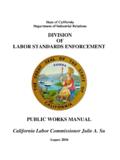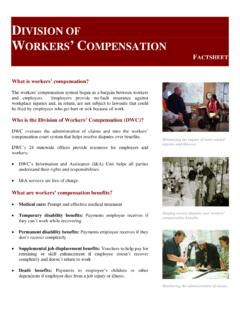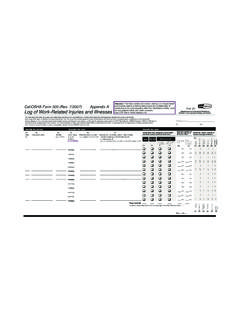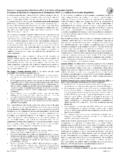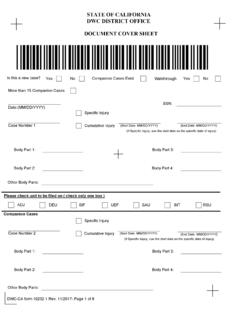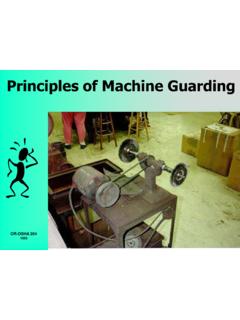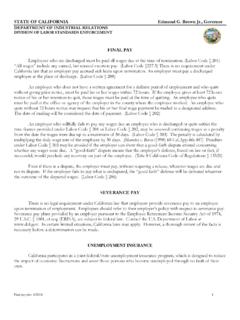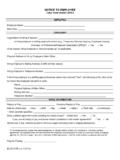Transcription of Glossary of workers’ compensation terms for injured workers
1 Division of workers ' compensation fact sheet B. Glossary of workers ' compensation terms for injured workers Accepted claim: A claim in which the insurance company agrees your injury or illness is covered by workers ' compensation . Even if your claim is accepted there may be delays or other problems. Also called admitted claim. Administrative director (AD): The person who is in charge of the operation of the Division of workers '. compensation . Agreed medical evaluator (AME): If you have an attorney, an AME is the doctor your attorney and the insurance company agree on to conduct the medical examination that will help resolve your dispute. If you don't have an attorney, you will use a qualified medical evaluator (QME). See QME. Alternative work: A new job with your former employer. If your doctor says you will not be able to return to your job at the time of injury, your employer is encouraged to offer you alternative work instead of supplemental job displacement benefits or vocational rehabilitation benefits.
2 The alternative work must meet your work restrictions, last at least 12 months, pay at least 85 percent of the wages and benefits you were paid at the time you were injured , and be within a reasonable commuting distance of where you lived at the time of injury. American Medical Association (AMA): A national physician's group. The AMA publishes a set of guidelines called Guides to the Evaluation of Permanent Impairment. If your permanent disability is rated under the 2005 rating schedule, the doctor is required to determine your level of impairment using the AMA's guides. Americans with Disabilities Act (ADA): A federal law that prohibits discrimination against people with disabilities. If you believe you've been discriminated against at work because you're disabled and want information on your rights under the ADA, contact a Equal Employment Opportunity Commission office.
3 For the EEOC office in your area, call 1-800-669-4000 or 1-800-669-6820 (TTY). AOE/COE (Arising out of and occurring in the course of employment): Your injury must be caused by and happen on the job. Appeals board: A group of seven commissioners appointed by the governor to review and reconsider decisions of workers ' compensation administrative law judges. Also called the Reconsideration Unit. See workers ' compensation Appeals Board. Applicant: The party -- usually you -- that opens a case at the local workers ' compensation Appeals Board (WCAB) office by filing an application for adjudication of claim. Applicants' attorney: A lawyer that can represent you in your workers ' compensation case. Applicant refers to you, the injured worker. Application for adjudication of claim (application or app): A form you file to open a case at the local workers ' compensation Appeals Board (WCAB) office if you have a disagreement with the insurance company about your claim.
4 Apportionment: A way of figuring out how much of your permanent disability is due to your work injury and how much is due to other disabilities. Audit Unit: A unit within the DWC that receives complaints against claims administrators. These complaints may lead to investigations of the way the company handles claims. Benefit notice: A required letter or form sent to you by the insurance company to inform you of benefits you may be entitled to receive. Also called notice. Cal/OSHA: A unit within the state Division of Occupational Safety and Health (DOSH). Cal/OSHA. inspects workplaces and enforces laws to protect the health and safety of workers in California. California Labor Code section 132a: A workers ' compensation law that prohibits discrimination against you because you filed a workers ' compensation claim, and against co- workers who might testify in your case.
5 Carve-out: Carve-out programs allow employers and unions to create their own alternatives for workers '. compensation benefit delivery and dispute resolution under a collective bargaining agreement. Claim form (DWC-1): The form used to report a work injury or illness to your employer. Claims adjuster: See claims administrator. Claims administrator: The term for insurance companies and others that handle your workers '. compensation claim. Most claims administrators work for insurance companies or third party administrators handling claims for employers. Some claims administrators work directly for large employers that handle their own claims. Also called claims examiner or claims adjuster. Claims examiner: See claims administrator. Commission on Health and Safety and workers ' compensation (CHSWC): A state-appointed body that conducts studies and makes recommendations to improve the California workers ' compensation and workplace health and safety systems.
6 Commutation: An order by a workers ' compensation judge for a lump sum payment of part or all of your permanent disability award. Compromise and release (C&R): A type of settlement in which you receive a lump sum payment and become responsible for paying for your future medical care. A settlement like this must be approved by a workers ' compensation judge. Cumulative injury (CT): An injury that was caused by repeated events or repeated exposures at work. For example, hurting your wrist doing the same motion over and over or losing your hearing because of constant loud noise. Date of injury: When you got hurt or ill. If your injury was caused by one event, the date it happened is the date of injury. If the injury or illness was caused by repeated exposures (a cumulative injury), the date of injury is the date you knew or should have known the injury was caused by work.
7 Death benefits: Benefits paid to surviving dependents when a work injury or illness results in death. Declaration of readiness (DOR or DR): A form used to request a hearing before a workers '. compensation judge when you're ready to resolve a dispute. Defendant: The party - usually your employer or its insurance company -- opposing you in a dispute over benefits or services. Delay letter: A letter sent to you by the insurance company that explains why payments are delayed. The letter also tells you what information is needed before payments will be sent and when a decision will be made about the payments. Denied claim: A claim in which the insurance company believes your injury or illness is not covered by workers ' compensation and has notified you of the decision. Description of employee's job duties (DWC form # AD ): A form to be filled out by the employer and employee to describe the employee's job duties.
8 The form will be reviewed by a physician to determine if the employee is able to return to work. disability : A physical or mental impairment that limits your life activities. A condition that makes engaging in physical, social and work activities difficult. disability Evaluation Unit (DEU): A unit within the DWC that calculates the percent of permanent disability based on medical reports. See disability rater. disability management: A process to prevent disability from occurring or to intervene early, following the start of a disability , to encourage and support continued employment. This is done early in the recovery process in severe injury cases such as spinal injuries. Usually a rehabilitation nurse is involved with you and your treating doctor and the progress of your medical treatment is reported to the insurance company. disability rater: An employee of the DWC disability Evaluation Unit who rates your permanent disability after reviewing a medical report or a medical-legal report describing your condition.
9 disability rating: See permanent disability rating. Discrimination claim (Labor Code132a): A petition filed if your employer has fired or otherwise discriminated against you for filing a workers ' compensation claim. Dispute: A disagreement about your right to payments, services or other benefits. Division of workers ' compensation (DWC): A division within the state Department of Industrial Relations (DIR). The DWC administers workers ' compensation laws, resolves disputes over workers '. compensation benefits and provides information and assistance to injured workers and others about the workers ' compensation system. Electronic Adjudication Management System (EAMS): A computer based system to simplify and improve the Division of workers ' compensation case management process . Employee: A person whose work activities are under the control of an individual or entity.
10 The term employee includes undocumented workers and minors. Employer: The person or entity with control over your work activities. Ergonomics: The study of how to improve the fit between the physical demands of the workplace and the employees who perform the work. That means considering the variability in human capabilities when selecting, designing or modifying equipment, tools, work tasks and the work environment. Essential functions: Duties considered crucial to the job you want or have. When being considered for alternative work, you must have both the physical and mental qualifications to fulfill the job's essential functions. Fair Employment and Housing Act (FEHA): A state law that prohibits discrimination against people with disabilities. If you believe you've been discriminated against at work because you're disabled and want more information on your rights under the FEHA, contact the state Department of Fair Employment and Housing at 1-800-884-1684.
